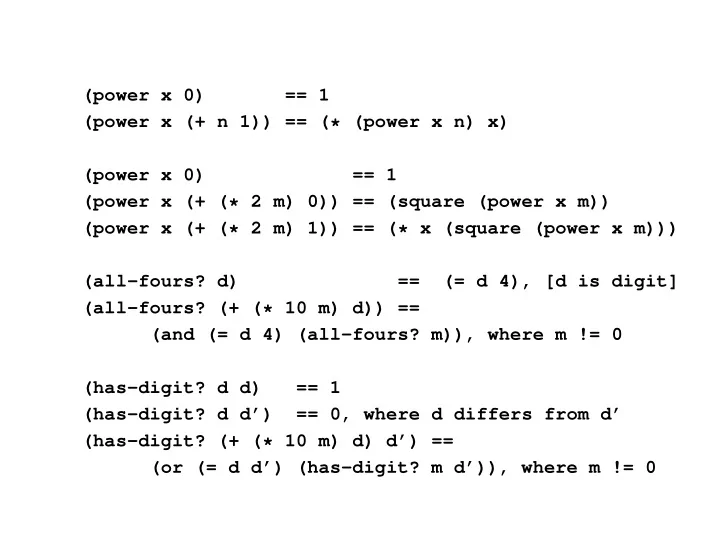

(power x 0) == 1 (power x (+ n 1)) == (* (power x n) x) (power x 0) == 1 (power x (+ (* 2 m) 0)) == (square (power x m)) (power x (+ (* 2 m) 1)) == (* x (square (power x m))) (all-fours? d) == (= d 4), [d is digit] (all-fours? (+ (* 10 m) d)) == (and (= d 4) (all-fours? m)), where m != 0 (has-digit? d d) == 1 (has-digit? d d’) == 0, where d differs from d’ (has-digit? (+ (* 10 m) d) d’) == (or (= d d’) (has-digit? m d’)), where m != 0
Bloom’s taxonomy (Metacognition 10) Cognitive actions: 1. Remember 2. Understand 3. Apply 4. Analyze 5. Evaluate 6. Create
Operational semantics Cognitive actions: 1. Remember 2. Understand 3. Apply 4. Analyze 5. Evaluate 6. Create
Concrete syntax for Impcore Definitions and expressions: def ::= (define f (x1 ... xn) exp) ;; "true" defs | (val x exp) | exp | (use filename) ;; "extended" defs | (check-expect exp1 exp2) | (check-assert exp) | (check-error exp) exp ::= integer-literal | variable-name | (set x exp) | (if exp1 exp2 exp3) | (while exp1 exp2) | (begin exp1 ... expn) | (function-name exp1 ... expn)
How to define behaviors inductively Expressions only Base cases (plural): numerals, names Inductive steps: compound forms • To determine behavior of a compound form, look at behaviors of its parts
First, simplify the task of specification What’s different? What’s the same? x = 3; (set x 3) while (i * i < n) (while (< (* i i) n) i = i + 1; (set i (+ i 1))) Abstract away gratuitous differences (See the bones beneath the flesh)
Abstract syntax Same inductive structure as BNF grammar (related to proof system) More uniform notation Good representation in computer Concrete syntax: sequence of symbols Abstract syntax: ???
The abstraction is a tree The abstract-syntax tree (AST): Exp = LITERAL (Value) | VAR (Name) | SET (Name name, Exp exp) | IFX (Exp cond, Exp true, Exp false) | WHILEX (Exp cond, Exp exp) | BEGIN (Explist) | APPLY (Name name, Explist actuals) One kind of “application” for both user-defined and primitive functions.
In C, trees are fiddly typedef struct Exp *Exp; typedef enum { LITERAL, VAR, SET, IFX, WHILEX, BEGIN, APPLY } Expalt; /* which alternative is it? */ struct Exp { // only two fields: ’alt’ and ’u’! Expalt alt; union { Value literal; Name var; struct { Name name; Exp exp; } set; struct { Exp cond; Exp true; Exp false; } ifx; struct { Exp cond; Exp exp; } whilex; Explist begin; struct { Name name; Explist actuals; } apply; } u; };
Let’s picture some trees An expression: (f x (* y 3)) (Representation uses Explist ) A definition: (define abs (n) (if (< n 0) (- 0 n) n))
Behaviors of ASTs, part I: Atomic forms Numeral: stands for a value Name: stands for what?
In Impcore, a name stands for a value Environment associates each variable with one value Written f x 1 7! n 1 : x k 7! n k g , � = ; : : associates variable x i with value n i . Environment is finite map, aka partial function x is defined in environment x 2 dom � � the value of x in environment � ( x ) � extends/modifies environment � to map x to v � f x 7! v g
Environments in C, abstractly An abstract type: typedef struct Valenv *Valenv; Valenv mkValenv(Namelist vars, Valuelist vals); bool isvalbound(Name name, Valenv env); Value fetchval (Name name, Valenv env); void bindval (Name name, Value val, Valenv env);
“Environment” is pointy-headed theory You may also hear: • Symbol table • Name space Influence of environment is “scope rules” • In what part of code does environment govern?
Find behavior using environment Recall (* y 3) ;; what does it mean? Your thoughts?
Impcore uses three environments Global variables � Functions � Formal parameters � There are no local variables • Just like awk ; if you need temps, use extra formal parameters • For homework, you’ll add local variables Function environment � not shared with variables—just like Perl
Recommend
More recommend